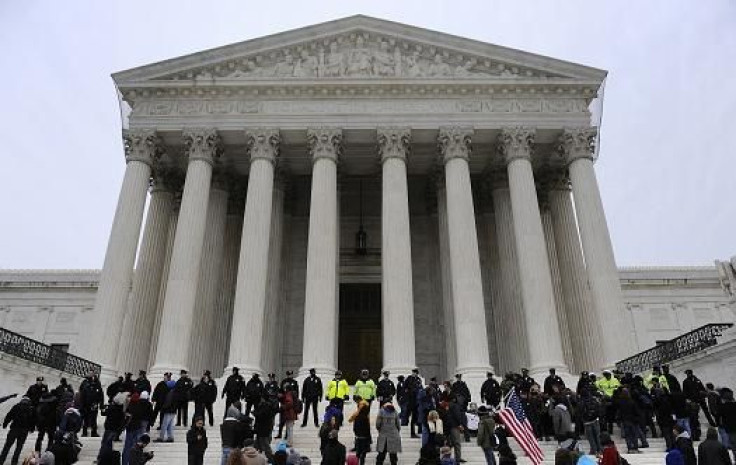What Is DOMA? SCOTUS Hears Defense Of Marriage Act Oral Argument

Oral arguments regarding the Defense of Marriage Act are on the U.S. Supreme Court's Wednesday docket, and the nation's attention turns today to this crucial federal law.
Signed into law by President Bill Clinton on Sept. 21, 1996, DOMA established that no American state, district or territory could be required to recognize a same-sex marriage that was performed in another state.
Click here to read the full text of the Defense of Marriage Act.
The law also laid out that the federal government does not recognize gay marriages for any purpose, ranging from issues related to immigration and joint tax filings to the issuance of federal insurance benefits and more.
This week the Supreme Court is hearing a day of oral argument each on the Defense of Marriage Act and Proposition 8, a California ballot measure that voters approved in November 2008, which amended the state's constitution to define marriage as only between a man and a woman.
Tuesday the justices considered oral arguments on Prop 8, as it is commonly known, and Wednesday is DOMA day, on which the court is hearing oral argument regarding the Defense of Marriage Act.
At the time of its passage, support among the U.S. population was strong for the Defense of Marriage Act, and it easily passed both the U.S. Senate and House of Representatives.
But over the past 17 years, the stigmas surrounding gay marriage have weakened, and currently 10 states have laws on the books allowing for the performance of gay marriages, while another 10 recognize same-sex civil unions or domestic partnerships.
As such, the Defense of Marriage Act has become increasingly controversial, and even Clinton himself has reversed his opinion on the law and now supports its repeal.
In 2008, then-presidential-candidate Barack Obama included support for repealing DOMA in his political platform. And the Obama administration stated in 2011 that it finds Section 3 of DOMA -- which codified the federal government's unwillingness to recognize same-sex marriages for all purposes -- to be unconstitutional, directing the Department of Justice to stop defending it in courts, though the House general counsel continues to do so at the behest of House Republicans led by Speaker John Boehner.
Eight federal courts have ruled that Section 3 of DOMA is unconstitutional via a variety of cases, setting up a controversy that the Supreme Court took on by agreeing on Dec. 7 to hear the United States v. Windsor case.
© Copyright IBTimes 2024. All rights reserved.











